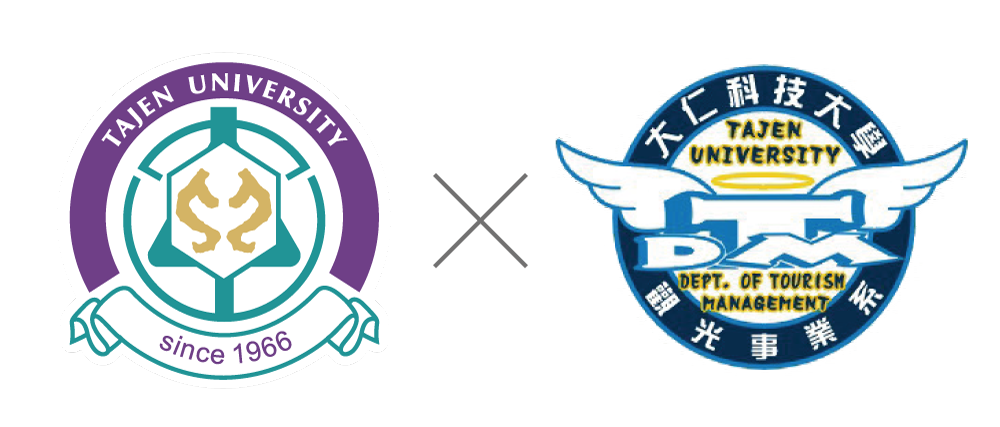
Introduction
Introduction
To cope with current economic development, along with the highly booming tourism industry worldwide, Department of Tourism Management at Tajen therefore was prepared and officially founded in August, 2006. Originally, we offered a four-year college program in the Night Division, two-year junior college programs in both the Day and Night Divisions, and a two-year junior college Continuing Education program. From August 2007, one class for a four-year college program and one class for a five-year junior college program were added in the Day Division. In August 2010, a Continuing Education program for two-year college students was set up to provide learning opportunities for working people and the department has been developed towards university school system ever since. Due to a decrease in student sources during recent years, to comply with the policy of Ministry of Education, we discontinued the two-year junior college programs in both the Day and Night Divisions in 2009, and the five-year junior college program, and then the two-year college program in the Night Division in 2010. Nevertheless, to provide more diversified education opportunities, we started a four-year Indigenous Program in the year 2015.
Educational Goals
Based on the social development trend and needs, student sources and traits, educational goals of our school and college, in accordance with the government and society’s tourism policy, our educational goals were set as follows:
1. To train travel and transportation management professionals
2. To train professionals for travel activity industries
Programs
Currently we offer four-year bachelor's degree programs (including the Indigenous Program) and a two-year junior college continuing education program.
Faculty
The department is composed of faculty members with doctoral and master’s degrees. Prestigious experienced members in the industry are also invited to teach related courses to offer students firsthand tips at workplace.
Nurture of Talents
(1) Talents of Tourism:
Taking into consideration the training of local professionals, talents starting businesses with local resources, the promotion of local food, integrated with tourism resources near our school and diversified cultural ethnic groups, we strive to train tourism related professionals and push ahead tourism related industries
(2) Talents with International Perspectives:
Through one-year internship in Taiwan or abroad, students can integrate theory with practice, familiarize themselves with job market and step into the workplace immediately after graduation without delay. Meanwhile, accompanied by teachers of the department to enhance foreign language skills and gain international perspectives, students are encouraged to participate in overseas study tour in Japan, including cultural, industry, and language learning.
(3) Indigenous Tourism Professionals:
Because of the geographic location of our school, the only Tourism Indigenous Program in the nation was established in 2015 to develop and promote tribe tourism.
Practical Teaching
(1)Teaming Up with Industries: we performed the Placement Courses Program (OP) subsidized by Workforce Development Agency, Ministry of Labor in 2014, and from 2015 to 2019 Ministry of Education’s Industry School program, which would train students to develop specific occupational skills required by participating companies and students could work directly for the companies after completing training.
(2)Curriculum for Practice: to integrate theory with practice, we have planned the practical curriculum, which include courses for practice, collaborative teaching of industry experts, tourism project, off-campus visit, internship, overseas study tour and overseas internship, allowing students to prepare themselves before entering the workplace.
Curricular Features
<Tourism Classroom>
Since we value workplace-oriented education and provide internationalized teaching environment where information is a must, the teaching planning is developed accordingly. Special classrooms were set up to improve students’ learning environment and teachers’ teaching quality, such as cabin classroom, airport simulation classroom, casino simulation classroom, duty-free shop, travel agency for interns, TV wall, guided tour and exposition practicing zone and students’ exhibition area. All the above spaces supply students with the benefit of learning from situated teaching and are also used as an important demonstration venue for guests and students from other schools. Moreover, a gaming classroom was built to train professionals for the demand of gaming industry, to reach the goal that graduation means employment.
<Language Training>
To increase students’ language proficiency, by working with the Department of Applied Foreign Languages, we have planned practical language classes concerning travel and tourism. Students can make the best use of our professional simulation classroom to practice workplace situation with English and Japanese, and to improve Tourism English. Tourism Japanese, and Business English. We also encourage students to take language evaluations and tests to enhance their competitiveness with foreign language ability.
<Professional Software>
To strengthen students’ professional skills, have them familiarized with the application of tourism software so that they can fully learn travel industry related information systems, we built a Travel/Transportation and Ticketing Management Classroom, purchased several practical application teaching software, such as ABACUS Global Distribution System software, test module for Certificates for Tour Leader and Guide, Cowell Travel Industry Information System and Geographic Information System GIS.
<Curriculum for Certificates>
To equip students to be tourism professionals and increase their career competitiveness, we have opened classes to assist them to get the professional certificates of tour leaders, guides, docents, OP/ticketing clerk, certified dealers and certified travel counselors.
<Internship>
With combination of theory and practice, students are arranged to work domestically or abroad for one year. They are able to accumulate practical experiences when working as interns and prepare themselves for future career development. Furthermore, they can enter the workplace immediately without delay.
Career Prospects
There are many career opportunities for the graduates. They can work as tour conductors, tour planners, travel agents, tour leaders/managers, tour guides, museum docents, government officials, clerks at hotels, theme parks, amusement parks, ranches, national parks, and so on.

 Home
Home Mail
Mail Site Map
Site Map